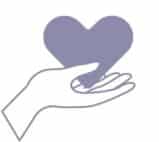Our Beauty Is Found in What Makes Us Unique
I want to talk about my lived experience and my day-to-day life, living independently whilst living with an enduring mental health problem.
So although given various mental health diagnoses from depression to psychosis in my late teens and early adulthood I had very little community support. This became even more limited once I was given a diagnosis of Borderline Personality Disorder as it was said people with BPD didn’t respond to treatment. We were just left to get on with it basically. What I do know now is that the symptoms I was showing were actually normal to the life trauma I had experienced in my life.
In the year 2007 after moving further down the country I was assigned a Community Psychiatric Nurse. She was really good with me. Coming out on visits to my home and generally building up a good therapeutic relationship with me. Once she realised the magnitude of my struggles I was also given a Mental Health Support Worker from a local mental health charity.
Lived experience of the revolving door
My reality at this time in my life was living independently whilst periodically going through the revolving door of an inpatient psychiatric hospital. Usually, admissions Sectioned Under The Mental Health Act. This was due to serious attempts I was making to end my life.
I would spend weeks, sometimes months on an acute inpatient ward. Once discharged back home I had to readapt to my old life again. These periods after discharge were very destabilizing and challenging. It felt like I had to relearn the basics of everyday life again. From meal planning to taking a shower independently. It was really hard coming from a closed and relatively supportive environment of a ward to living on my own again and having to juggle all my own balls.
My alcohol intake increased dramatically
I spent many years using alcohol as a coping mechanism, as a way of control. I could control how drunk I got, but not how low and desperate I felt all the time. How suicidal I was feeling.
However, I reached a point where the alcohol habit was no longer useful to me. It didn’t achieve anything or give me the oblivion that I was desperately seeking. It didn’t give me respite from the suicidal feelings. Without the alcohol, the intensity of my feelings and the suicide attempts increased.

The nitty-gritty of lived experience
Day-to-day life was hard and very isolating. For example, Sunday was bittersweet for me. It was the day I had a community with people at church, but then the intense feeling of isolation facing a Sunday afternoon and week ahead mainly alone. Having left my friends for their own family time. One where I perceived them to be enjoying a nice family Sunday dinner and summer afternoon outings together.
Except with my two beloved dogs Clover and Daisy I had no real routine. The days tended to blend into one. No weekend with family booked, No holidays planned. My days were about survival, keeping my head above water both practically and emotionally, and keeping myself away from the hospital ward. It was hard, very hard. I was expected to do all the norms of living – running a home coupled with navigating my own mental health issues. Constantly lurching from one crisis to another. Constantly juggling all the balls of practical and emotional life.
I was determined to fit in with society’s norms. Even with my new church community I wanted to present as Tina with no issues. In time my friends came to realise the extent of my struggles and the enormity of my mental health problems. I think this changed their perception of me. I have made friends and lost friends over the years. Some could not cope with the complexities of my mental health and knowing how to deal with the issues that arose from them.
Where do I fit in with my lived experience?
I do not fit into society’s norms. I have my own lived experience. I feel as though I have and continue juggling the balls of mental and practical life. These are not the balls most people in society juggle with, like work and family commitments. These are the choices they have made in life. These balls that I have were thrown at me and I had no choice. Like with my mental health and now over recent years my physical health issues. This has left me questioning what real choices I have really had in my life. Wondering what life would have been like if I didn’t have a mental health problem.
Do mental health problems remain a taboo?
We say we live in an all-exclusive and accepting society. Does mental health remain a final taboo? how does society really view mental health and those managing it? Where is the difference between those experiencing chronic and occurring mental health instances and those who may only experience one period of mental ill health in their lifetime?
How do we become less scared of mental health and those living with it? When cases highlighted in the news always seem to be when the individual has been failed by the system at large.
Can society change it’s perception of mental health uniqueness?
Surely as a society we need, alongside the media to be seen and to be heard. To be seen as normal. To have the stigma attached to mental health problems broken down.
How do we as as society do this? More education in schools and the workplace to begin with maybe ?
Take mental health sick days in the workplace for example. Who could phone their employer and say they are unable to come in work that day because of a crushing low mood? It’s much more acceptable to call in sick with a ‘stomach bug’ than to express the real truth and reality of our own mental health.
Until those with mental health problems are fully seen with all the uniqueness & complexities and individuality they bring, we will continue to be excluded from our society and allow the stigma around mental health problems to continue.


